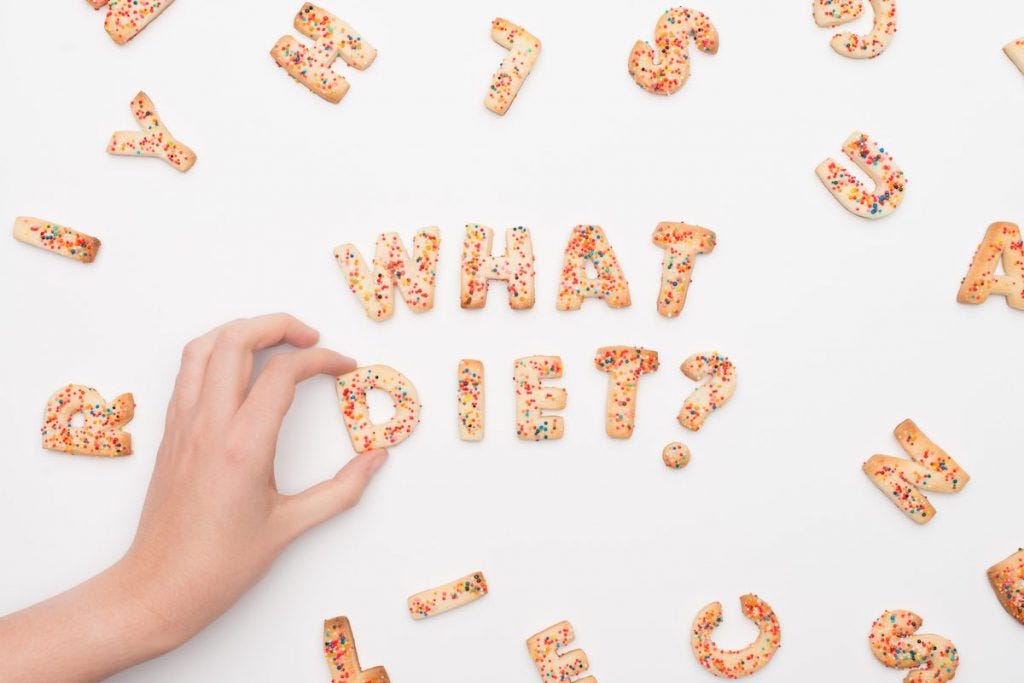How to Ditch Diet Culture & Improve Your Relationship with Food
When you’re striving for a healthy lifestyle, you may know some of the basics: eat well, exercise, avoid smoking and excessive alcohol, etc. However, something more subtle is at work when it comes to adopting and maintaining a realistic, healthy lifestyle…it’s your mindset.
How you think about and arrive at the decisions you make regarding food and health-promoting behaviors are just as important as what’s on your plate. Sometimes, even with the best of intentions, you can get stuck in unhealthy patterns with eating or exercise.
Maybe you’re tired of being caught in a grueling cycle of starting strong, making a choice inconsistent with your goals, and feeling defeated. You might even wonder how this cycle started in the first place.
In this article, we’ll discuss how to identify harmful thought patterns that could be sabotaging your ability to stay on track with your health goals.
What is Diet Culture?
Diet culture is a hot topic these days. There’s a lot of nuance within the topic because it spans many cultural discussions. It’s viewed through a health lens as well as a political and social justice lens.
Generally speaking, diet culture is based on the idea that some foods are “good” while others are “bad,” certain body types are superior to others and normalizes negative self-talk regarding body image and health choices.
You may or may not be aware of the ways diet culture is influencing your thoughts and behaviors. Someone with a diet culture mentality might:
- Engage in negative self-talk that conflates food choices or body image with self-worth, such as
- “I can’t eat sweets, they have way too many calories.”
- “I used to be small like you, those were the days!”
- “You shouldn’t eat that, it’ll go straight to your hips.”
- “I have to eat a salad today, I was bad and had pizza yesterday.”
- Obsess over calorie or macro counting
- Jump from diet to diet with little success
- Be desperate to try the latest diet pill or skinny tea, regardless of experts’ advice against its use due to lack of evidence regarding the efficacy
- Using excessive filters and/or photoshopping images posted to social media to feign an “ideal” body image
If you find yourself dealing with these bad thought habits, you might think some of them are harmless. However, these thought patterns can erode your sense of self-worth over time, causing you to associate what you eat and how you look with your value as a person. When your identity becomes wrapped into how closely you fit an ever-evolving standard of healthiness, it’s a trap that can be tricky to get out of.
Why is Diet Culture Harmful?

These behaviors can cause you to obsess over areas of your health journey that aren’t conducive to creating long-term success. What’s more, these thoughts can lead some people to develop eating disorders if they go unchecked. While most people won’t develop an eating disorder, far more people have disordered eating patterns and don’t realize it.
This can include a habit of bingeing and restricting foods that you consider “bad,” such as sweets, fried foods, and fast food. Bingeing and restricting looks like avoiding these foods to “be good” while ignoring your body’s cravings. Then, when the craving becomes too difficult to manage, you binge and overeat the item you’ve been craving and feel guilty and defeated. The alternative to this vicious cycle is something many dietitians refer to as “food freedom.” This is the idea that you can honor your body’s hunger and fullness cues and mindfully enjoy foods you crave without demonizing them all while maintaining a healthy balanced lifestyle.
While some may think it sounds far too good to be true, this is truly possible. Food freedom doesn’t mean having zero boundaries and eating whatever foods you want all the time.
It’s a practice based on mindfulness that shifts your focus from obsessing over calories to listening to what your body is telling you it needs. Food freedom and mindful eating go hand in hand and work well together to help you create balance with food.
It takes practice and continually reframing your thoughts, and you may seek the help of a non-diet dietitian if you think you’d benefit from targeted one-on-one advice.
5 Simple Ways to Improve Your Relationship with Food
Now that we’ve delved into the often-harmful mentality that is diet culture, what can you do if you find yourself caught up in it?
There are a few ways to combat diet culture in your day-to-day life. The first thing to do is conduct a self-assessment.
Ask what lies you currently believe that could be based on a diet culture mentality. Consider how you think and speak about your body and eating patterns, and other’s bodies and food choices.
Here are some other quick tips for improving your relationship with food:
1. Ditch the All-or-Nothing Mindset
Your diet is healthy when it’s balanced overall, and that includes enjoying healthy treats. Try to be more open-minded about what foods you “allow” yourself to eat.
You may have a laundry list of off-limit items that are inconsistent with your goals. But ask yourself: is this practice something that truly helps you maintain self-control, or is it a preemptive guilt trip that you’ve implemented to keep yourself in line? If it’s attached to shame or condemnation, it’s best to let it go.
You can eat the foods you know aren’t health-promoting in moderation and fully enjoy them, without feeling bad about it. But you must abandon the all-or-nothing mentality.
2. Set Realistic Goals
Don’t try to change everything overnight…set realistic goals. Take small, realistic steps and be specific about your intentions. Then, focus on one intention at a time until it becomes second nature.
For example, maybe you love brownies and want to enjoy them as part of your healthy lifestyle without feeling guilty each time you eat them. Your first step may be journaling about what fears you associate with eating brownies. Getting your emotions out on paper can help you process them.
Your next step may be making brownies and enjoying them with friends or family, without calling it a “cheat” day. These subtle shifts in your mindset can have a big impact on your overall attitude toward your relationship with food.
3. Find Support and Accountability
You aren’t alone on your journey. There are many people seeking to adopt a healthier mentality about food, so find a community of like-minded people so you can stay on track.
Social media is a good resource for this, including Facebook groups. If you suspect that you or someone you know may have an eating disorder, you can find professional help and support groups online.
4. Find Healthy Coping Mechanisms
One of the reasons people end up stuck in a binge-restrict cycle is because they’re struggling to find healthy coping mechanisms for other stressors in their life. This might apply to you if you find yourself staying on track with your goals until stress at work or in a relationship comes up.
Then, you struggle to stay on track because food is a comfort measure. This can lead to guilt and frustration. If that sounds familiar, learning alternative ways to cope with stress will be another component to achieving food freedom for you.
5. Fine-tune Your Social Media Feed
Your mental diet is important, too. Who you follow and why you feel the need to partake in their content is highly important to creating and maintaining a healthy mindset.
If you’ve heard that you become like the five people you spend the most time with, know that social media should be included on the list of who is shaping you and your mindset. If you’re struggling with body image and follow tons of Instagram models for “inspiration,” but feel defeated and overall negative after you view that content, unfollow or mute their profile for a while. You can always refollow once you’re in a better mental space.
Lastly, there are many dietitians on Instagram and Facebook publishing great content on this topic. This will help you fill your feed with positive reminders about food and body image. Here are two great food freedom dietitians to follow:
- Bonnie Roney, Dietitian and Founder of Diet Culture Rebel
- Colleen Christensen, Dietitian and Founder of Colleen Christensen Nutrition
Final Thoughts
Diet culture is a pervasive and harmful ideology that often subtly makes us feel unworthy if we don’t fit an arbitrary standard of health and beauty. However, there’s a growing movement toward food freedom that promotes balance and inclusivity with food and body image. While there are different takes on the matter within the movement, food freedom is ultimately about making peace with food and your body by shifting your mindset.
By being mindful and intentional with what you eat and how you move your body and knowing that your value isn’t based on eating a “perfect” diet or having an ideal body shape, you can rid yourself of the heaviness that can come with diet culture and enjoy foods you love while walking in freedom.
At BrainMD, we’re dedicated to providing the highest purity nutrients to improve your physical health and overall well-being. For more information about our full list of brain healthy supplements, please visit us at BrainMD.
- Good vs. Bad Carbs: How to Create a Balanced Diet with Healthy Carbs! - January 27, 2022
- How to Make Homemade Salad Dressings + Recipes! - August 28, 2021
- How to Ditch Diet Culture & Improve Your Relationship with Food - August 25, 2021



